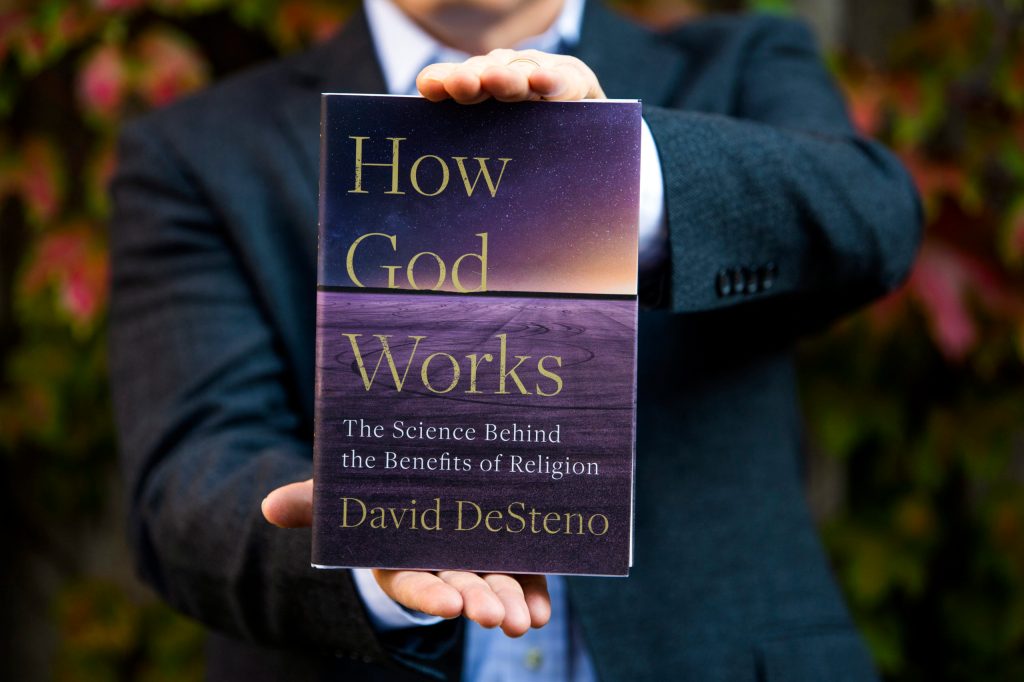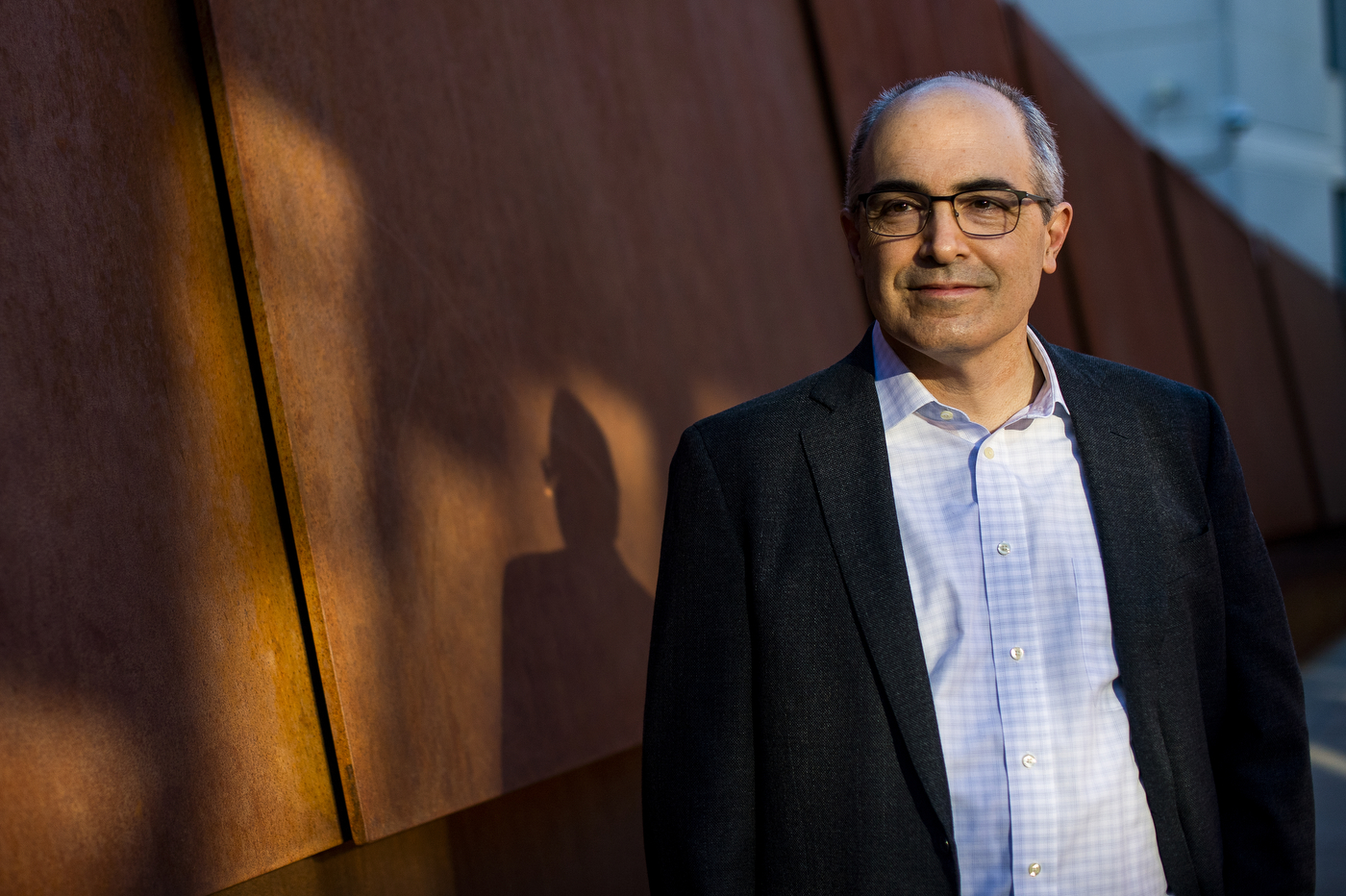David DeSteno believes science can learn from religion

A career of groundbreaking inquiry began with the choice that David DeSteno made as an undergraduate.
“I was deciding between being a religious studies major and a psychologist,” says DeSteno, a professor of psychology at Northeastern. “I felt like I could get more answers by taking the scientific route. But the questions were ones that always fascinated me. What makes people moral? How do they find connection in this world? How do they become more compassionate?”
The result is DeSteno’s latest book, “How God Works: The Science Behind the Benefits of Religion.” It explores why religious practices and rituals can be beneficial to anyone, whether they believe in the religion or not.

DeSteno, a Northeastern professor of psychology, has been studying the intersection of religion and science at his Social Emotions Lab. Photo by Alyssa Stone/Northeastern University
DeSteno has also launched a podcast of interviews, “How God Works with David DeSteno,” in which guests help him explore the intersections of science, religion, and human experience. The podcast is broadcast by PRX, a public media organization.
DeSteno’s Social Emotions Lab has been studying how meditation produces passion, how the synchronous movements of religious groups make people feel more connected, and how religious gratitude results in greater patience, honesty, and generosity.
“This book is my attempt to say, sure, we’re not going to find out much about the nature of the universe or the biology of disease from religion,” DeSteno says. “But if you want to understand how to help people make life better, how to help them deal with the challenges life throws at them, it would be strange if thousands of years of [religious] thought didn’t have something to offer.”
DeSteno spoke with News@Northeastern about the relationship between religion and science. His comments have been edited for brevity and clarity.
What can science learn from religious rituals?
We as scientists need to study them and learn from them and see what we can extract from them—in a way that is respectful—to help us solve many of life’s problems. If we’re too hubristic to look there, we’re slowing our own progress because we’re ignoring a corpus of information.
All religions tell people, you should be kind, you should be generous, you should do these wonderful things. What we’re figuring out now is the spiritual practices themselves—different types of prayer, different kinds of rituals—actually affect our bodies and minds in ways that give us tools to do that. So it’s not just here’s what you should do; but here are some tools that help you do it.
What makes these rituals so powerful?
There are lots of different practices built into rituals that help us deal with the challenges we’re facing.
Let’s look at mourning rituals as an example. One thing that all rituals of mourning have in common is we tend to eulogize the person who has passed. But if you think about it, it’s actually kind of strange, because if I just lost a job that I really loved, or my wife has left me and I really loved her, I wouldn’t want to think about how wonderful that job was, or how wonderful my wife was, because it makes the pain that much worse.
There’s research showing that people who can form and reinforce positive memories of loved ones they’ve lost, those are the people who have less debilitating grief, less debilitating anxiety.
Does the tension between science and religion resonate with other examples of polarization that are emerging throughout society?
There is a tension. On the fundamental side of religion, there are some who say science has no role, truth comes from God and the sacred texts. And then there are some scientists—primarily folks who are leading the new atheist movement—who look at religion and say not only is it a kind of superstition and silly, but it’s a plague on the rational mind.
The thing I like to remind people is, look, there’s no way to tell if God exists. There’s no scientific proof. The most hardcore scientists will say, ‘I see no evidence of God but I can’t prove that God doesn’t exist.’ So why are we going to argue about something that we can’t prove?
People who are engaged in religious practices live longer, healthier, and happier lives on average. So there’s something there. These tools are doing something.
Scientists and religious leaders together want to make the world better for people. Let’s study the practices.
Has your focus on religion made you a better scientist?
I think so, because it allows me to look for new ideas and things to study in ways that I wouldn’t have before.
Does it make me a better scientist in terms of my craft? No. But does it give me new ideas to study and explore that could benefit people? Yes.
By applying a scientific perspective to the age-old rituals of religion, do you believe we could develop approaches to help people in all kinds of ways?
We’ve done this with meditation, right? We all know there are measurable benefits from meditation that increase people’s focus, lowers their stress. What I tell people is it can’t be the only spiritual practice that works. It’s not a fluke.
So what is the next mindfulness? There’s something out there if we’re willing to look. We just have to be open to doing it.
What do you say to those who fear the power of religion?
Science is powerful. Richard Dawkins, the foremost atheist, will say things like, ‘You want to find the most efficient way to kill the most people quickly? Science is your friend.’ Yes, he’s right. ‘If you want to find the best way to save people from the coronavirus, science is your friend.’ Yes, he’s right.
People will say, ‘Look at all the wars and terrible things it [religion] has caused.’ Yes, it has. But I think of these practices as the tools religions use: They can be used for good or they can be used for ill.
People are leaving institutionalized religion in droves for good reasons: There’s been all types of scandals with abuse, financial scandals, gender discrimination, etc. But the people who are leaving, most of them aren’t becoming atheists. They’re looking for new ways to be spiritual, because I think they realize that in leaving this organized faith, they’re also missing these tools in some ways that help them deal with life’s challenges.
For media inquiries, please contact media@northeastern.edu.






